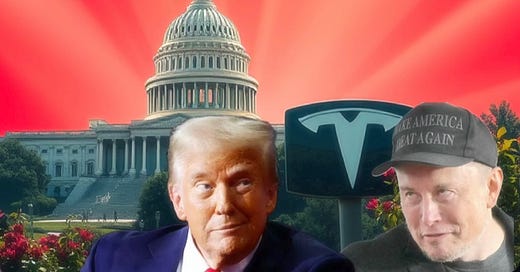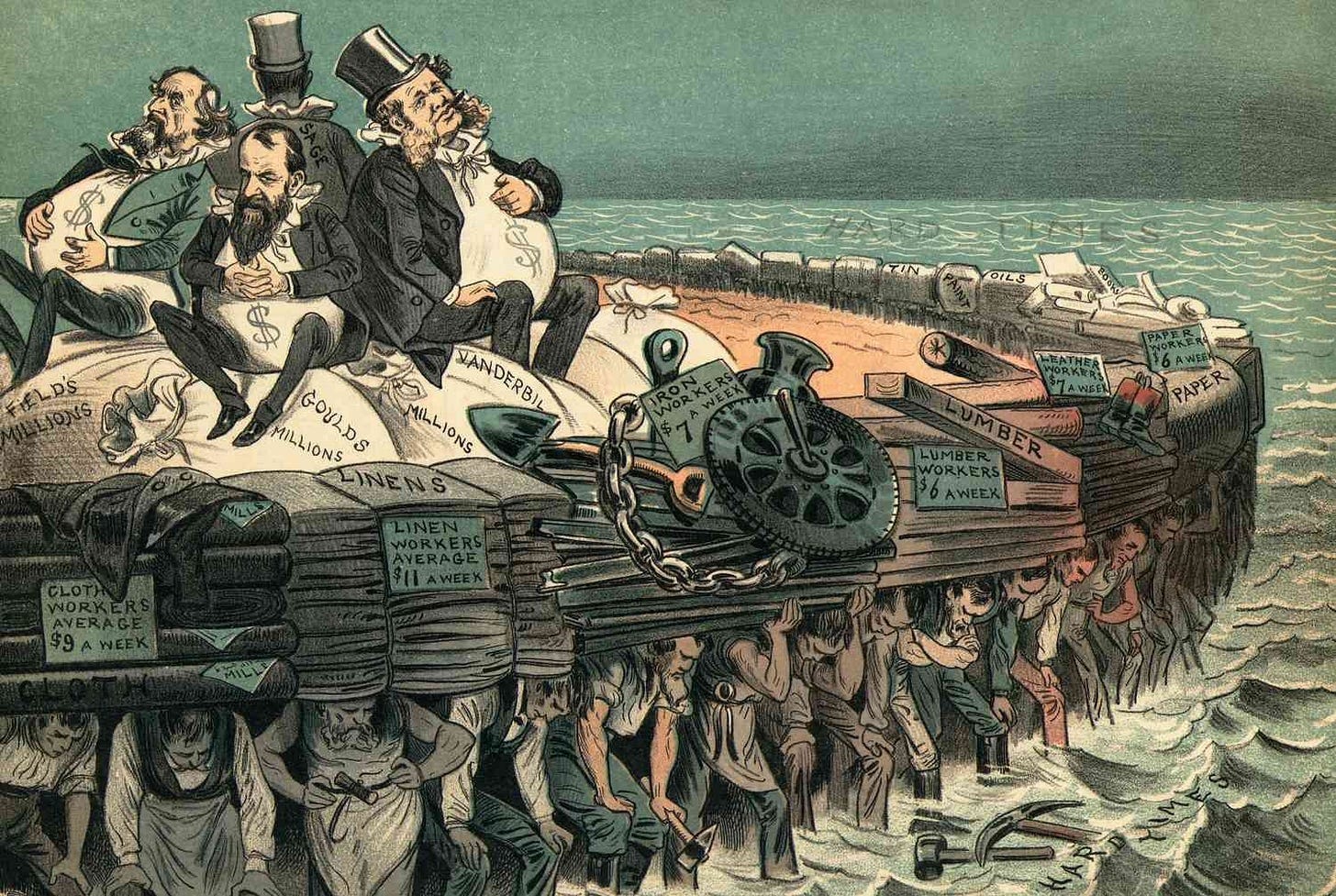Today Joseph Robinette Biden ends a 55-year career in American politics that started at the county level and ended in the Oval Office. Today also marks the return of Donald Trump to the White House after a four-year hiatus that began with an insurrection and ended with him earning the moniker “Felon.”
Many believe today also marks what could be the end of democracy as the bedrock of our political system and the birth of a ruling elite. While the ultra-wealthy increasingly seize control of seats of power, backed by powerful policy think tanks like The Heritage Foundation, some rightly fear an American Oligarchy has taken root.
During President Biden’s farewell address last Wednesday, he reminisced about his four years in office. While time was devoted to spotlighting his achievements, Biden did more than just tout his successes. He also offered a dire warning.
“I want to warn the country of some things that give me great concern. And this is a dangerous concern. And that’s the dangerous concentration of power in the hands of a very few ultra-wealthy people. Today, an oligarchy is taking shape in America of extreme wealth, power and influence that literally threatens our entire democracy, our basic rights and freedoms, and a fair shot for everyone to get ahead.” — President Joe Biden
Mirriam-Webster defines an oligarchy as a “government by the few; a government in which a small group exercises control especially for corrupt and selfish purposes.” The wealthy have always controlled the political landscape to some degree. It’s nearly impossible to find a first-world nation where the rich don’t hold significant power. However, the amount of influence, and how it’s used varies among countries.
Throughout the history of the United States, the country has endured eras where a small percentage of the country’s elites controlled most of the country’s wealth. Prior to the American Civil War, in his 1838 "Lyceum Address," Abraham Lincoln issued a warning to the country about the dangers of unchecked power, specifically as it relates to the concentration of wealth and authority.
"At what point then is the approach of danger to be expected? I answer, if it ever reaches us, it must spring up among us; it cannot come from abroad. If destruction be our lot, we must ourselves be its author and finisher. As a nation of freemen, we must live through all time, or die by suicide." — Abraham Lincoln, 1838
Lincoln argued that the erosion of democracy often begins with moral and political corruption within the government—often facilitated by the wealth of power-hungry elites.
Lincoln’s warning was prophecy. Just 23 years later, the first shots of America’s Civil War rang out at Fort Sumter, South Carolina. Following a bloody war that claimed the lives of nearly 700,000 Americans, the country entered what Mark Twain coined “The Gilded Age.” Spanning from the late 1870’s to the early 1900’s, this period was marked by “rapid industrialization, immigration, economic growth, and prosperity for the wealthy. It was also a time of exploitation and extreme poverty for the working class.” The tycoons of the Gilded Age, known as “robber barons”, owned 51% of our nation’s wealth, while the bottom 44% owned only one percent of that wealth. The most prominent robber barons included Andrew Carnegie, Cornelius Vanderbilt, and John D. Rockefeller.
The robber barons of the Gilded Age were deeply embedded in the government, using their wealth and influence to shape policies and regulations in their favor (pay attention later). They wielded significant political clout through lobbying efforts, campaign contributions, and even direct appointments to government positions.
While the Gilded Age was a time of immense economic growth and modernization, a stark chasm grew between the very rich and the very poor. Society grappled with rampant political corruption, an immigration boom, labor unrest, as well as decrepit working and living conditions. As a result of the large influx of immigrants, primarily from Europe, urban centers such as New York and Chicago became overcrowded and notorious for their dilapidated tenements and disease infested slums.
Society became aware of the horrid living and working conditions in American cities with the publication of Upton Sinclair’s novel and exposé, The Jungle. American’s nationwide were outraged, particularly due to the graphic descriptions of unsanitary conditions in the meatpacking industry. As Americans pushed back against the corruption of the country’s elites, they ushered in a new era. With the assent of Theodore Roosevelt to the presidency after William McKinley’s assassination in 1901 the United States entered its “Progressive Era.” Progressives championed reform and governmental regulation to reign in the excesses of the Gilded Age. Disgusted by dangerous working conditions, child labor laws were passed and workers fought back by forming labor unions and organizing strikes. In regard to the Progressive Movement, historian Richard Hofstadter suggests the movement sought to “restore a type of economic individualism and political democracy that was widely believed to have existed earlier in America and to have been destroyed by the great corporation and the corrupt political machine.” - The Age of Reform
One might argue that money coupled with power has always played a role in politics. To a degree, it has. But up until recently, there were guardrails in place to limit the amount of influence any one interest had on our government. The Federal Elections Act of 1971 prohibited direct corporate and union donations to political parties, candidates, or political action committees (PACs). While corporations couldn’t donate directly, they could create corporate PACs into which employees, shareholders, and other affiliates could donate to political campaigns. At the same time, there were also limits as to how big individual donations to a corporate PAC could be.
So how did we get to where we are today? To answer that question, we first have to go back to the late 19th century. In the 1886 case of Santa Clara County v. Southern Pacific Railroad, the Supreme Court ruled that corporations were entitled to the same rights as people under the 14th Amendment. This legal concept become known as “corporate personhood.” In 2010, the Supreme Court expanded the controversial concept of corporate personhood with its ruling in Citizen’s United v. Federal Elections Commission. The Court ruled that “the freedom of speech clause of the First Amendment prohibits the government from restricting independent expenditures for political campaigns by corporations including for-profits, nonprofit organizations, labor unions, and other kinds of associations.” This ultimately removed all limits to corporate campaign donations, meaning elections could be essentially bought by the highest bidder(s).
While the amount of money being funneled into campaigns at all levels of government has risen, so has the wealth of our elected leaders and those serving alongside them.
And that brings us to today. As of Inauguration Day 2025, President Trump has an estimated net worth of $6.8 billion. If all of his cabinet picks are confirmed, he will have the wealthiest administration in modern history consisting of at least 13 Billionaires holding a net worth of nearly $500 billion (compared to the $118 million net worth of Biden’s Cabinet).
When it comes to policy making, consider the direct influence Elon Musk may enjoy during the second Trump administration. While Musk is not a member of President Trump’s cabinet, he’ll be working with Vivek Ramaswamy and directly influencing policy in the newly created Department of Government Efficiency (which ironically requires two leaders to operate efficiently). The DOGE will be tasked with restructuring the federal government and removing regulations in order to cut costs and increase efficiency. This may sound good on the surface, but it also leaves the decision making up to two individuals who could easily attempt to sway policy in the direction of self-profit.
In October of 2022, Elon Musk became the owner of X (formerly known as Twitter), the world’s largest and most powerful social media platform. X is also the biggest disseminator of misinformation, disinformation and alt-right propaganda. During the 2024 election cycle, it’s believed Musk engineered the platform’s algorithms to push right-wing and alt-right accounts to the tops of user’s feeds. Those same algorithms also boosted election misinformation and promoted the accounts of influencers who were found to be (indirectly) on Russia’s payroll.
The consolidation of social media ownership among the ultra-rich is another harbinger of an American Oligarchy. In Meta and X, billionaires Mark Zuckerberg and Elon Musk own and control the world’s two most popular and powerful social media corporations. By the manipulation of content algorithms, Zuckerberg and Musk can determine what users see and prioritize content to influence public opinion and potentially achieve any political, monetary, or societal goal they wish.
Not long after buying Twitter, Musk put an end to fact checking and content control that led to an influx of foreign bot accounts, especially from Russia. These foreign bot accounts were responsible for the dissemination of election disinformation, and anti-Ukraine and pro-Russian propaganda on X. Hashtags like #MAGA and #ImWithHer were used to manipulate trending topics and create the illusion of grassroots movements that seemingly supported or opposed specific candidates.
Mark Zuckerberg recently announced that “Meta will end their third-party fact checking program and loosen their hate speech restrictions.” These eased/eliminated restrictions will leave the door open for misinformation and hate speech that could disproportionately impact the LGBTQ+ community, people of color, and other marginalized groups. In fact, Meta went as far as to say that it will now allow “allegations of mental illness or abnormality when based on gender or sexual orientation, given political and religious discourse about transgenderism and homosexuality and common non-serious usage of words like ‘weird.’”
No one can know for certain what the next four years will ultimately bring. However, with an unprecedented concentration of wealth at top levels of the federal government and its periphery, economic inequalities reminiscent of the 19th century’s Gilded Age, and the desire of some elites to further marginalize the already marginalized, it wasn’t hyperbolic for President Biden to warn of a rising "Oligarchy.”
“So what can I do?” you ask?
Stay informed while remaining mindful of the sources you trust for news.
Get involved! There are countless grassroots advocacy groups working tirelessly to promote the rights of marginalized communities and all Americans..
Run for local office. Local school boards, park district boards, and city councils create policies that affect you on a daily basis. Be a part of the decision making process in your own community. (I ran for my local high school board of education in 2023 and won. It’s been a wonderful and rewarding experience!)
Most importantly…DO NOT OBEY IN ADVANCE!
“Most of the power of authoritarianism is freely given. In times like these, individuals think ahead about what a more repressive government will want and then offer themselves without being asked. A citizen who adapts in this way is teaching power what it can do.” - Timothy Snyder, On Tyranny







